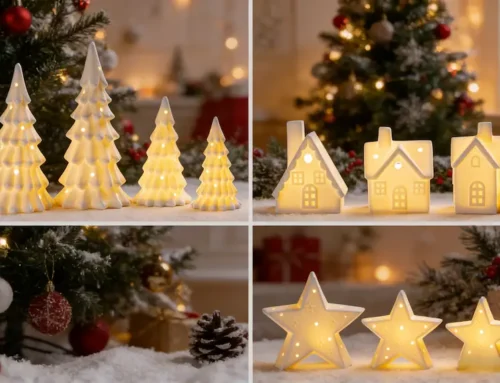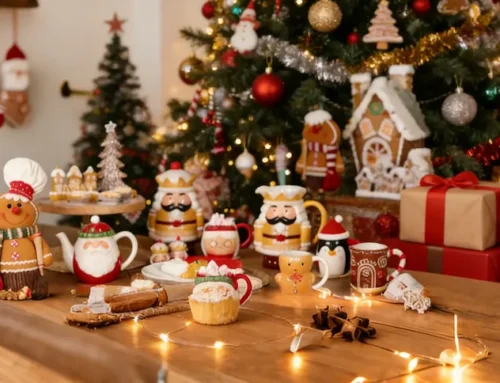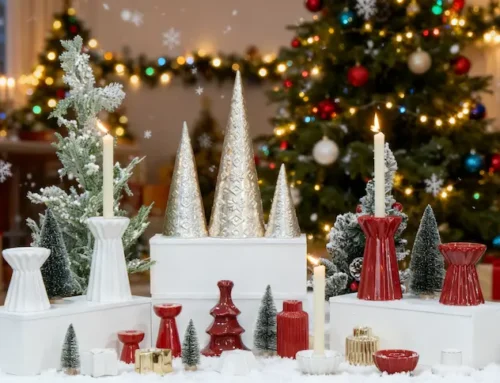1. Introduction to Ceramic Glazes
Ceramic glazes are specialised coatings applied to ceramic surfaces, designed to enhance both beauty and functionality. For any ceramic tableware supplier, understanding glaze types is crucial to offering durable, safe, and visually appealing products.
From a business perspective, the choice of glaze impacts not just aesthetics, but also the usability, safety certification requirements, and export readiness of your tableware. A well-chosen glaze can differentiate your products in a competitive market.
2. Key Components of Ceramic Glazes
- Silica: The main glass-forming element.
- Alumina: Provides hardness and viscosity.
- Fluxes: Help silica melt at kiln temperatures.
- Colourants: Add pigment and aesthetic value.
- Opacifiers: Create opaque finishes, often using zirconium oxide.
These components are carefully selected by ceramic glaze suppliers to produce specific results.
Pro Tip for Buyers: The glaze composition affects both final appearance and food safety compliance. Always request full material data sheets and ask about firing temperature compatibility.
3. Functional Benefits of Ceramic Glazes for Tableware
- Aesthetic Appeal: Adds colour, gloss, and texture
- Waterproofing: Makes the ceramic non-porous
- Protection: Guards against scratches and stains
- Ease of Cleaning: Smooth surfaces are more hygienic
- Food Safety: Non-toxic glazes prevent leaching
For ceramic tableware exporters, these benefits are key selling points when entering global markets.
Buyer Insight: Hotels and restaurants increasingly request glazes that balance visual uniqueness with dishwasher and microwave safety. Choosing the right glaze allows suppliers to meet both aesthetic and functional expectations.
4. Common Types of Ceramic Glazes
Clear Glaze
Highlights natural ceramic beauty or painted patterns. Perfect for custom glazed tableware.

Use Case Example: Many rustic dinnerware collections in Europe use clear glazes over textured clay bodies to create a raw, artisanal look. This finish is also highly popular among sustainable lifestyle brands.
Glossy Glaze
Offers a shiny, polished finish. Ideal for luxury ceramic tableware collections.
Use Case Example: Glossy finishes are often seen in wedding dinnerware and holiday collections due to their high light reflectivity and vibrant colour enhancement.
Matt Glaze
Gives a modern, non-reflective look. A favourite for Scandinavian-style tableware suppliers.
Application Tip: Matt glazes can vary in surface texture—some are smooth and soft to the touch, while others have a slight grit for tactile interest. Discuss options with your supplier before customising.
Coloured Glaze
Provides vibrant or subtle tones. Useful in themed or seasonal dinnerware collections.
Trend Alert: 2025 colour trends favour deep greens, muted blues, and warm neutrals. Coloured glazes offer a low-cost way to follow seasonal aesthetics without changing moulds or shapes.
Cracked (Crackle) Glaze
Vintage-style crack lines for decorative use. Best for retro-inspired tableware distributors.
Buyer Note: Crackle glazes are not always food-safe unless specially sealed. They’re better suited for outer surfaces or non-contact areas.
Reactive Glaze
Each piece has a unique pattern. Popular in artisan ceramic tableware.
Production Insight: Reactive glazes involve multiple oxide interactions, and results vary per kiln batch. Ideal for low-volume, high-margin markets.
Metallic Glaze
Adds luxury with shimmer. Common in event and hotel dinnerware supply.
Important Consideration: Some metallic glazes may contain traces of metals not suited for microwave use. Be sure to check with your ceramic mugs manufacturer about specific applications.
Pearl Glaze
Subtle shimmer mimicking natural pearls. Used in high-end ceramic dining collections.
Pro Tip: Pearl glaze performs best on light or pastel-coloured clay bodies. Over dark bodies, the shimmer effect may be muted.
5. The Glazing Process for Ceramic Tableware
- Raw Material Selection
- Mixing and Slurry Creation
- Application (Dipping, Brushing, Spraying)
- Drying Before Kiln Firing
- Firing at 1000°C – 1300°C
Each glaze type has a specific firing range. For B2B buyers, it’s important to confirm the firing temperature with your ceramic dinnerware manufacturer to avoid functional defects like pinholes or crazing.
Workflow Note: Most suppliers conduct test tiles before mass production. Ask for glaze samples on your actual body clay to check the final effect.
6. Application Scenarios for Ceramic Tableware Suppliers
Home Use
Clear, glossy, and matt glazes are practical and aesthetic for daily tableware. They’re generally dishwasher-safe and easy to clean.
Restaurants & Hotels
Coloured, satin, and reactive glazes meet durability and design demands. For branding, hotels often opt for customised coloured glazes to match interior themes.
Special Events & Banquets
Metallic and crackle glazes create elegance and exclusivity for event tableware suppliers. These are commonly used in upscale catering and corporate gifting sets.
Case Study: A German hospitality chain recently adopted pearl-glazed tableware for their VIP brunch series. The result: increased brand differentiation and positive guest feedback.
7. Ensuring Food Safety: Lead-Free and Cadmium-Free Glazes
Certified food-safe ceramic glazes are a must. Look for:
- FDA or EU certifications
- Clear labels indicating lead- and cadmium-free formulas
Common Tests:
- Migration tests according to ISO 6486 or ASTM C738
- SGS or Intertek third-party validation
Exporter’s Checklist:
- Always ask for material compliance declarations (MSDS)
- For Europe: Check REACH and LFGB compliance
- For USA: Verify Prop 65 labelling requirements
8. How to Choose the Right Glaze for Your Tableware Business
- Consider target market (home, hotel, banquet)
- Match aesthetics to brand values
- Ensure functionality and durability
- Partner with experienced ceramic glaze manufacturers in China
Customisation Tip: Many ceramic glaze suppliers offer R&D support to help develop exclusive glaze colours or finishes that match your branding.
9. Why Work with a Professional Ceramic Tableware Supplier?
At Homey Ceramic, we:
- Use only high-quality, certified glazes
- Offer full customisation on finish, shape, and colour
- Serve ceramic tableware wholesalers and importers across Europe and beyond
We understand the latest market trends and compliance requirements for B2B buyers in retail, hospitality, and gifting sectors.
Visit: www.homeyceramic.com
10. Final Thoughts
Glaze selection is more than a surface-level decision—it affects usability, appearance, and safety. For ceramic tableware suppliers and distributors, choosing the right glaze ensures your products meet market demands while standing out in style.
What Our Clients Say
“Working with Homey Ceramic has been a breeze. We needed custom reactive glaze coffee mugs for our café franchise, and they were able to match our mood board exactly. The final result was even better than we expected!”
— Martin L., Purchasing Director, Germany
“Their expertise in glaze application is outstanding. We developed a premium teaware line with Tenmoku and Celadon options, and our customers love the finish.”
— Emilie R., Ceramic Product Manager, France
Frequently Asked Questions (FAQ)
Q1: Can I customise the glaze colour to match my brand palette?
A1: Yes! Just send us your colour sample, Pantone code, or reference photo. We’ll match and provide a test sample for approval.
Q2: Are all glazes food-safe?
A2: Most are, but some decorative or crackle glazes may require sealing. We follow EU & US safety standards and can certify food-safe items upon request.
Q3: What’s the minimum order quantity (MOQ) for custom glaze products?
A3: Typically 500–1,000 pieces depending on the item. However, we can discuss lower MOQs for trial projects or niche collections.
Q4: Do you accept OEM or logo branding?
A4: Absolutely. We support logo printing, embossed logos, laser engravings, and more.
Q5: How long does sampling take?
A5: Around 10–15 working days for custom glaze testing, depending on complexity.
Are you a ceramic tableware supplier, café chain buyer, or hospitality distributor looking for custom glazed solutions? Contact Homey Ceramic today to explore premium, lead-free, and elegant glaze finishes that elevate your collection. Let us help you deliver safe and stunning tableware to your market.
???? Reach out for catalogue download, sample requests, or glaze R&D consultation.






